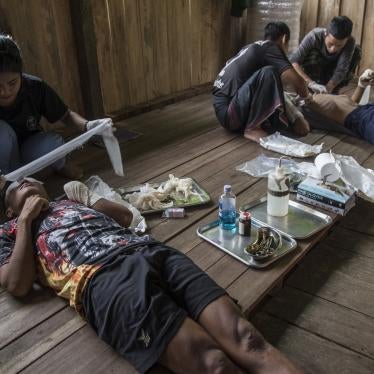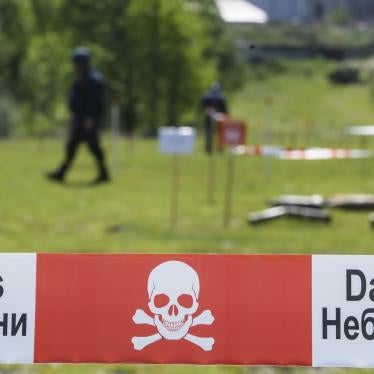Thank you, Mr. President,
The destruction of 55 million stockpiled antipersonnel landmines under the Mine Ban Treaty is one of its most lasting and life-saving accomplishments.
Only two of the Mine Ban Treaty’s 164 States Parties still have stockpiled antipersonnel mines left to destroy.
The rest have either completed their stockpile destruction obligation or had no mines to destroy in the first place.*
The original stockpile destruction deadline for Greece was 1 March 2008, while Ukraine had a deadline of 1 June 2010. Both have been granted multiple deadline extensions. Neither has indicated when they might complete this crucial task.
We appreciate the update provided today by Greece, which previously shared that it has been working to overcome contractual and regulatory issues that prevented any stockpiled mines from being destroyed in 2020 and 2021. We are encouraged to hear that the Hellenic Defence Systems—the company tasked with destroying the remaining stocks—will sign an agreement in the coming days to destroy the mines within the next 18-months, as we understand it.
The ICBL urges Greece to set a firm completion deadline, to intensify its efforts and devote the necessary resources for stockpile destruction, and to provide monthly progress reports to States Parties.
In Ukraine, we regret that has been no stockpile destruction since 2020 and the end of an agreement between Ukraine’s Ministry of Defense and NATO’s Support and Procurement Agency to destroy the remaining stockpiled mines at the Pavlograd Chemical Plant.
Mr. President, the ICBL is appalled by Russia’s use of antipersonnel landmines in Ukraine, which we have repeatedly condemned. In June, the ICBL expressed serious concern over the safety and security of the more than 3.3 million PFM-series antipersonnel mines in Ukraine’s stockpile after Russia’s all-out invasion of the country.
The ICBL appreciates Ukraine’s efforts today to clarify for States Parties the status of the PFM-series antipersonnel mines that were in storage awaiting destruction. We seek confirmation from Ukraine that the stocks are still under its jurisdiction and control.
We seek reassurance that the PFM mine stocks will not be used in combat operations. This is especially important given the allegations that Ukrainian forces have used PFM-series antipersonnel mines in the conflict.
We are encouraged by Ukraine’s pledge to submit an annual updated transparency report.
We hope that the Mine Ban Treaty President and States Parties, including from the Committee on Cooperative Compliance, can consult and work together to help find creative solutions to support Ukraine to complete its stockpile destruction.
Lastly, we would also like to address the issue of mines retained for training for research and training purposes in accordance with Article 3.
The good news is that 95 States Parties do not retain any antipersonnel mines, including 41 states that once possessed them in the past. This shows how a majority of States Parties now agree that there is no need to use live mines for research and training purposes.
However, 68 States Parties are still retaining antipersonnel mines for training and research purposes, of which 28 each retain more than 1,000 mines. At the top of the retention list are Finland, Sri Lanka, and Bangladesh, who are currently retaining more than 12,000 mines each.
The ICBL has long expressed concern at the large number of States Parties that are retaining mines but apparently not using them for the permitted purposes. Rather they are simply being stockpiled.
All these states should either utilize the mines for permitted purposes or destroy them urgently.
Thank you.
* Tuvalu does not possess landmines but must provide an Article 7 transparency report for the treaty to formally confirm this mine-free status.








